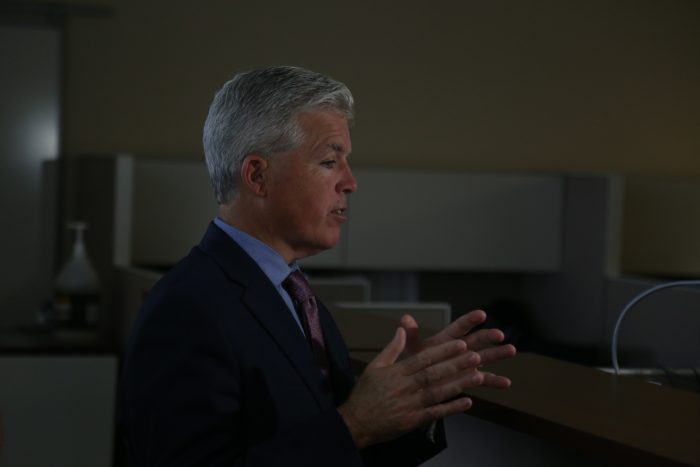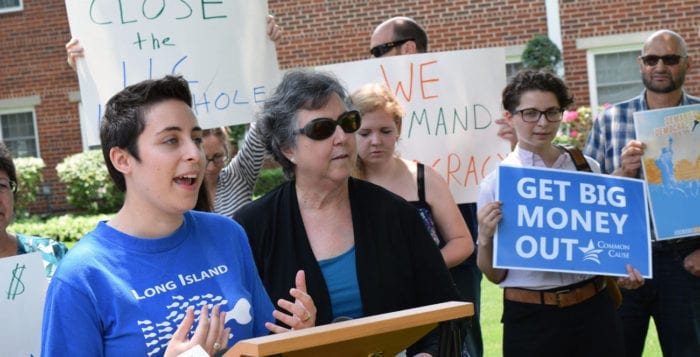Correction: Good Energy is New York-based
First, thank you for the in-depth March 9 article about Community Choice Aggregation in Long Island. It is a well-written article that shares much important information about CCA programs.
Long Island residents and businesses can benefit from such programs for years, so the more information, the better. Such CCA programs will enable Long Islanders to secure stable, low energy rates and also feature renewable energy options. That is, indeed, important news for Long Islanders.
As a media contact for Good Energy, I would like to add a small — but important — correction and a clarification to that article.
Good Energy is mentioned as being a London-based company. It’s an understandable error because there is a United Kingdom-based company with the same name as ours. However, Good Energy LLC is based in Manhattan, with employees on Long Island and has been helping New York and other states create CCA programs for more than 20 years.
For our company, it’s important that residents of the Town of Brookhaven and the rest of Long Island know we are a New York-based business working for New Yorkers. We look forward to serving Brookhaven as the energy consultant for their CCA program. Part of that service is providing Brookhaven with new, exciting renewable energy options.
I would also request that your publication clarifies the scope of Good Energy’s CCA program: The Town of Brookhaven’s Community Choice Aggregation Program is for gas, electricity and renewable energy.
In fact, Good Energy is currently working with Brookhaven officials to develop such renewable energy projects. More news about that will be coming soon.
Doug Donaldson
Media Representative
Good Energy LLC
New York
Fund the state’s new campaign finance program
In a representative democracy, money should not be the determining factor in whether a person can run for public office. When working-class people run and serve in public office, our government works better for working families. Yet too often, the process is dictated by wealthy donors and special interest groups, making it difficult for the average person to run for office and win. The New York State Public Campaign Finance Program would help to change that.
This new state program would eliminate barriers and level the playing field for good, qualified people to run for public office. Under the new system, individual contributions of between $5 and $250 would be eligible for public matching funds, enabling candidates — incumbents and challengers — to spend their time fundraising among more of the people they seek to represent, as opposed to wealthy megadonors. This makes it easier for ordinary people without access to wealth to run for office, with the support of our communities.
Instead of officeholders who are beholden to corporate donations, special interests and megadonors, they would be listening to constituents who built their campaign, one small donation at a time. Furthermore, these small donors would be engaged in the process to a greater degree, as they have a personal connection with the candidate who represents them and the community. This is what a government of, by and for the people is all about.
Unfortunately, no one will be able to make use of public campaign finance if there is no funding allocated to the program. Our legislators must take bold action and fully fund the Public Campaign Finance Program this year, so that candidates can begin using it in the 2024 election cycle, as the law intended. This funding must be a part of our fiscal year 2024 budget that is currently being negotiated in Albany.
We in Suffolk County know all too well that special interests dominate the process. Special interests who hold power with our Republican and Conservative county legislators that killed Suffolk County’s public campaign finance program before it began. We cannot let this happen again at the state level. I urge you to let your state legislators know that you support New York’s Public Campaign Finance Program, and that you want your government to represent you, not the special interest groups. That is the leadership and democracy we deserve.
Shoshana Hershkowitz
South Setauket
Friendly, generous people
I would like to share how my wife and I have twice been the recipients of little acts of kindness.
The first occurred when we were dining in a Port Jefferson restaurant with another couple. The man, John, was telling us that he had fought in Europe in World War II. A few minutes later, our waitress informed us that the people in the next booth had paid for John’s meal. A thank-you for his service. We, of course, went to their booth and thanked them.
More recently my wife and I had finished lunch at Outback Steakhouse in East Setauket, and the check arrived. The total appeared to be wrong, and I asked our waitress about it. She explained that the couple at the next table had some money left on their gift card and requested that it be applied to our bill. Unfortunately, they had left before we learned this, and we could not thank them. Whoever you are, if you read this: A profound thank-you for your generosity. I will pay it forward.
Steven Perry
Rocky Point
On the road again
March 12 was the 101st anniversary of East Northport resident Jack Kerouac’s birth.
It made me reread one of his best writings, “On the Road.” His works remind me of the more adventurous spirit of youth.
Sadly, as we get older, with more responsibilities and less free time, there are fewer journeys to take, but the ideals of Kerouac continue to live in all of us.
Larry Penner
Great Neck
WRITE TO US … AND KEEP IT LOCAL
We welcome your letters, especially those responding to our local coverage, replying to other letter writers’ comments and speaking mainly to local themes. Letters should be no longer than 400 words and may be edited for length, libel, style, good taste and uncivil language. They will also be published on our website. We do not publish anonymous letters. Please include an address and phone number for confirmation.
Email letters to: [email protected]
or mail them to TBR News Media, P.O. Box 707, Setauket, NY 11733







